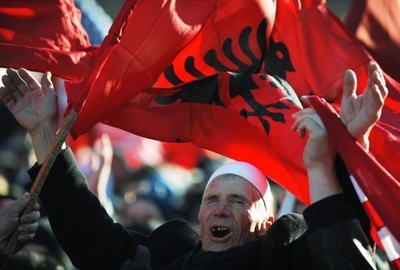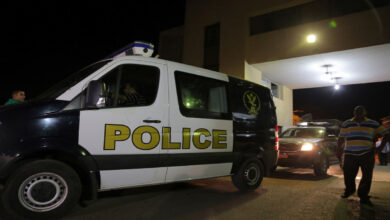
Western powers which have overseen Kosovo since its 2008 unilateral declaration of independence from Serbia have ended their supervision over the territory, a top official said Monday.
The Kosovar leadership welcomed what it called a "historic turnaround" but also recognized the challenge of trying to integrate the ethnic Serbs in the north while Serbia dismissed the announcement as meaningless.
"The supervision of Kosovo is finished," Dutch diplomat Pieter Feith, the highest international representative in Kosovo, told a press conference, speaking in Albanian.
"The International Steering Group has decided to end the period of [Kosovo's] supervised independence," Feith said.
Prime Minister Hashim Thaci called the decision a "historic turnaround" for Kosovo.
"This is an international success for Kosovo which confirms that the international community respects Kosovo," he said at the joint press conference with Feith.
The International Steering Group (ISG), made up of 23 European Union members, Turkey and the United States, had overseen Kosovo for the last four years.
In July the ISG said the end of supervision would mean Kosovo would gain "full sovereignty." However, on the ground Pristina has no effective control over Serb-majority northern Kosovo, which rejects the ethnic Albanian authorities.
Thaci conceded Monday that there was a lot of work still to be done.
"Many challenges await Kosovo, among them, the integration of the Serbs in the north," he said.
US President Barack Obama hailed the ISG move as a "historic milestone" for Kosovo, over four years after its hotly contested declaration of independence.
"With the optimism, energy and determination characteristic of its people, Kosovo has made significant progress in solidifying the gains of independence and in building the institutions of a modern, multi-ethnic, inclusive and democratic state," Obama said in a statement.
Kosovo and its 2 million majority ethnic-Albanian population had been under some form of international administration since a NATO bombing campaign forced then Serbian strongman Slobodan Milosevic's troops out of the Serbian province in 1999.
The end of so-called supervised independence will not affect the presence of the NATO-led KFOR peacekeeping force in charge of security or European rule-of-law mission EULEX, which was created to boost the justice system.
Kosovo is among the poorest regions in Europe, with almost half of the population jobless and poor, according to international surveys.
The Zeri newspaper warned Monday of "many challenges ahead" as "expectations of the citizens were not fulfilled."
Serbia — which has never accepted Kosovo's declaration of independence on 17 February 2008 — dismissed the sovereignty announcement as meaningless.
Kosovo's independence has been recognized by some 90 countries, including most EU nations, but is rejected by Belgrade, Russia and Kosovo's own ethnic Serbs, who make up about 6 percent of the population, living mainly in the north.
The end of international supervision was marred by a Serbian prosecutor's revelation on the eve of the ISG's meeting that Belgrade has a former Kosovo rebel witness who allegedly took part in removing the heart of a Serb prisoner for the international black market in organs during the 1998-1999 Kosovo conflict.
Kosovo's foreign minister, Enver Hoxhaj, dismissed the revelation as "propaganda" and an attempt to "blacken a very big day for Kosovo."
Claims of organ harvesting from Serb prisoners by the KLA during and after the war are being investigated by the EU.
In 2010 a hard-hitting Council of Europe report found that a group of Kosovo Albanian rebels closely linked to Thaci carried out organ trafficking during and after the conflict with Serbian forces.
Thaci and the Kosovo authorities have denied the claims.




